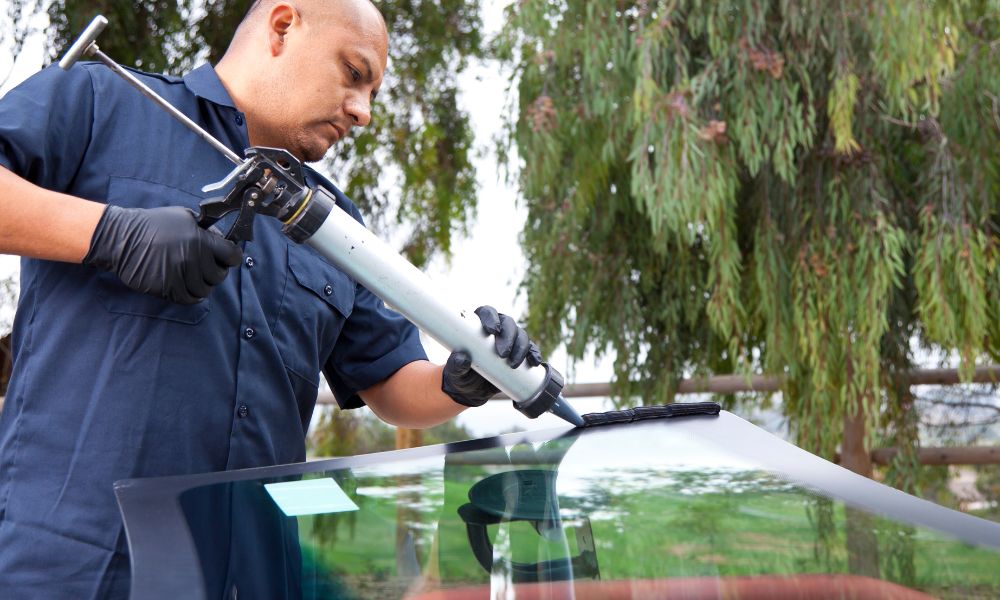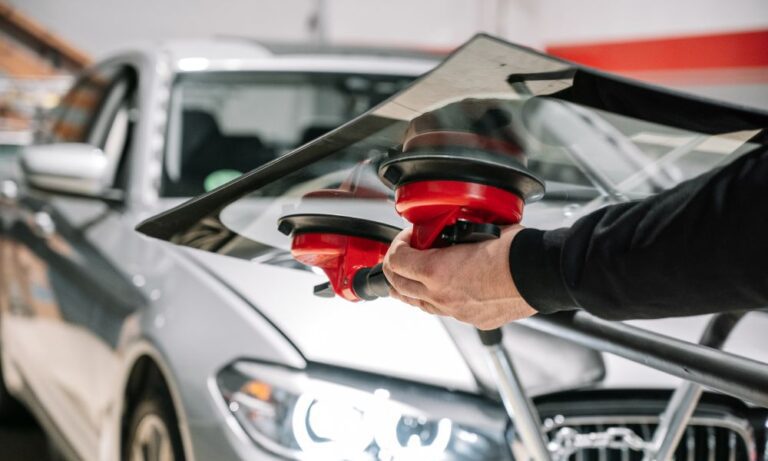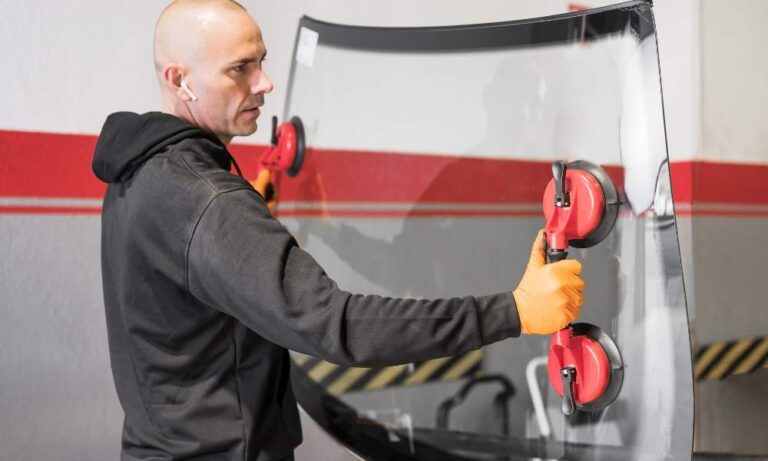In this blog post, we will delve deeper into the...
Auto Glass Care in Extreme Weather Conditions: Snow, Heat, and Rain

Your vehicle’s glass serves as a vital component in ensuring your safety and comfort while on the road. It provides visibility, protection, and structural integrity. However, auto glass is constantly exposed to various weather elements, including extreme conditions like snow, heat, and rain.
These conditions can significantly impact the longevity and functionality of your auto glass. In this comprehensive guide, we will explore the effects of snow, heat, and rain on auto glass and provide valuable tips for proper care and maintenance.
A. Snow:
Effects of Snow on Auto Glass:
Snowfall can create challenging driving conditions and have a notable impact on your vehicle’s glass. When snow accumulates on your auto glass, it can lead to reduced visibility, which is a major safety concern. Additionally, the weight of accumulated snow can stress the glass, potentially causing cracks or even shattering under extreme conditions.
Care and Maintenance:
- Clear Snow Promptly: After a snowfall, make sure to clear all snow from your vehicle’s windows, windshield, and roof. Use a soft-bristle brush or a snow scraper to avoid scratching the glass.
- Prevent Ice Formation: To prevent ice from forming on your windshield overnight, place a cardboard or rubber mat on the glass. You can also use a commercial ice-resistant windshield cover.
- Use Defrosters Properly: Use your vehicle’s defrosters to melt ice and snow from the glass. Start your car a few minutes before driving and allow the defrosters to work.
- Avoid Abrasive Materials: When removing ice, avoid using metal scrapers or other abrasive tools that can scratch the glass. Opt for plastic scrapers or deicing solutions.
- Regularly Check for Damage: After snowstorms, inspect your auto glass for any signs of damage, such as chips or cracks. Addressing these issues promptly can prevent them from worsening.
B. Heat:
Effects of Heat on Auto Glass:
High temperatures and prolonged exposure to sunlight can also take a toll on your vehicle’s glass. Extreme heat can cause the glass to expand, potentially leading to stress fractures or weakening of the material. Moreover, intense sunlight can contribute to fading of the dashboard, upholstery, and other interior components.
Care and Maintenance:
- Park in Shade: Whenever possible, park your vehicle in a shaded area to reduce direct exposure to the sun. If shade is limited, consider using a windshield sunshade to block UV rays.
- Crack the Windows: Leaving your windows slightly open when parked can help equalize the temperature inside the vehicle, reducing the risk of glass expansion and stress.
- Use Window Tinting: Applying window tint can significantly reduce the amount of heat entering your vehicle, protecting both the glass and the interior.
- Avoid Sudden Temperature Changes: Avoid blasting cold air conditioning directly onto hot auto glass, as rapid temperature changes can stress the glass and lead to cracks.
- Regular Cleaning: Keep your auto glass clean, as dirt and debris can absorb heat and contribute to temperature-related stress. Use a mild glass cleaner and a microfiber cloth for best results.
C. Rain:
Effects of Rain on Auto Glass:
Rainwater itself may not directly damage auto glass, but its effects on visibility and driving conditions are crucial. Rain can mix with dirt and oils on the glass, creating a film that reduces visibility. Heavy rain and thunderstorms can also create hazardous driving conditions, increasing the risk of accidents.
Care and Maintenance:
- Use Windshield Wipers: Ensure your windshield wipers are in good condition and replace them when they become worn. Use appropriate wiper fluid to effectively clean the glass.
- Apply Rain-Repellent Coating: Consider applying a rain-repellent coating to your windshield. These coatings help water bead up and roll off the glass, improving visibility during rainy conditions.
- Check Window Seals: Properly sealed windows prevent rainwater from seeping into your vehicle. Regularly inspect the rubber seals around your windows and replace them if they show signs of wear.
- Repair Chips and Cracks: Address any chips or cracks promptly, as rainwater can exacerbate these issues by seeping into the damaged areas and causing further damage.
- Keep Rear Windows Clean: Clean your rear windows regularly to ensure clear visibility through your rearview mirror during wet conditions.
Conclusion:
Your auto glass plays a crucial role in your overall driving experience and safety. Extreme weather conditions like snow, heat, and rain can pose challenges to the integrity and functionality of your glass.
By following the care and maintenance tips outlined in this guide, you can ensure that your auto glass remains in optimal condition, providing you with clear visibility, protection, and peace of mind, regardless of the weather. Remember, proper care today can prevent costly repairs and replacements in the future.
Popular Searches
Audi Windshield Replacement in Santa Clara County
Auto Car Window Tinting in Santa Clara County
Auto Glass Repair and Replacement in Santa Clara County
Auto Glass Repair in Santa Clara County
BMW Windshield Chip Repair in Santa Clara County
BMW Windshield Repair and Replacement Services in Santa Clara County
Car Window Repair in santa clara
Car Window Repair in Santa Clara County
Commercial truck windshield replacement
Dodge Windshield Repair and Replacement Services in Santa Clara County
Dodge Windshield Replacement in Santa Clara County
Glass repairs for cars near me
Honda pilot windshield replacement cost
Honda Windshield Repair and Replacement Services in Santa Clara County
Honda Windshield Replacement in Santa Clara County
Hyundai Tucson windshield replacement
Hyundai Windshield Repair and Replacement Services in Santa Clara County
Hyundai Windshield Replacement in Santa Clara County
Jeep Windshield Repair and Replacement Services in Santa Clara County
Jeep Wrangler Windshield Replacement in Santa Clara County
Kia Windshield Repair and Replacement Services in Santa Clara County
Kia Windshield Replacement in Santa Clara County
Mobile Auto Glass in Santa Clara County
Mobile Auto Glass Repair in Santa Clara County
Mobile glass replacement near me
Same day windshield repair near me
Toyota Camry side mirror glass replacement
Windshield Calibration in Santa Clara County
Windshield Chip Repair in Santa Clara County
Windshield chip repair near me
Windshield Repair and Replacement Services in Santa Clara County
Windshield Repair and Replacement Services Near Me
Windshield Repair in Santa Clara County
Windshield repair service near me
Windshield Replacement Near Me
Windshield Replacement Services in Santa Clara County
Read more Articles
Auto Glass Safety Standards: What Every Vehicle Owner Should Know
In this blog post, we will delve deeper into the...
Signs It’s Time to Replace Your Auto Glass: Cracks, Chips, and Beyond
In this blog post, we will delve deeper into the...



